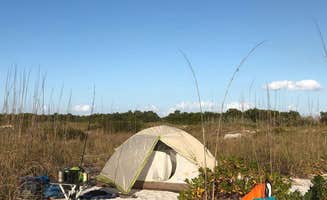Dispersed camping options near Longboat Key, Florida extend beyond the barrier islands to several undeveloped wilderness areas within paddling or driving distance. These primitive sites typically require self-sufficiency with no amenities provided. Temperatures in this Gulf Coast region remain mild year-round, averaging 73°F, though summer humidity can be challenging for tent campers. Most dispersed camping areas enforce strict environmental protection rules that limit access and activities.
What to do
Shell hunting at low tide: Shell Key Preserve offers abundant shoreline exploration opportunities when water recedes. According to one visitor, "Get your permit online. Park off the Pinellas Byway before you get to the DeSoto bridge, paddle between Summer Resort Key and Sister Key and you're there. One of the easiest island paddles out there - just a little over a mile."
Paddling excursions: Peace River Banks Backcountry provides miles of navigable waterways suitable for canoes and kayaks. "Canoeing and kayaking are preferred mode of transportation but I've seen others use Jon boats and airboats," notes one Peace River camper.
Wildlife observation: The undeveloped nature of these camping areas creates prime habitat for native Florida species. "We saw sting rays, a baby turtle, many different birds and other wildlife within 5 minutes of parking the boat," reports a Shell Key visitor.
What campers like
Isolation from crowds: Despite proximity to urban areas, Shell Key Preserve provides relative seclusion. "Others camping were far enough away that they didn't disturb us," explains one camper who reached the island by paddleboard and kayak.
Cost-effective adventure: Primitive camping options typically involve minimal or no fees. One camper notes, "The greatest thing about camping here is that it's super cheap, secluded, and so beautiful."
Water access on multiple sides: The geographic configuration of Shell Key creates unique recreational opportunities. A camper explains, "On the west coast of the island is the blue waters of the Gulf of Mexico, while only footsteps away is the lush waters of the Intercoastal waterway."
What you should know
Transportation requirements: Most dispersed sites require watercraft access. One Shell Key visitor clarifies, "Nice primitive area... and is only accessible via boat, canoe, kayak...bring everything you need to eat and drink and then remember to pack it back out."
Limited tent placement options: Undeveloped terrain creates challenges for setting up camp. According to one visitor, "There are no specifically cleared sites so you do need to be mindful that there are lots of plants, shrubs, sticks and stones which can make being in a tent pretty rough if you don't have a good pad and a tarp to protect your tent."
Variable crowding conditions: St. Pete rest area (north) and similar accessible locations may experience fluctuating visitor numbers. One Shell Key camper notes, "It is pretty popular so if you aren't into crowds or making new friends, you may want to stay at home or around your boat."
Tips for camping with families
Plan for limited shade: Many rustic camping areas near Longboat Key feature minimal tree cover. Bring portable shade structures and sun protection. "If you're up for hot, unpredictable weather and sand everywhere, I would recommend trying out this spot," advises one Shell Key visitor.
Allow extra travel time: Water access adds complexity with children. A visitor who brought gear by paddleboard and kayak reports, "We paddled from Ft Desoto with all of our gear roped on. Once you get to the island, it is 100% primitive as it's a preserve."
Consider age-appropriate activities: The primitive nature of these sites requires preparation for entertaining children. "You can enjoy most water activities as well as what nature has to offer from bird and dolphin watching to fishing and hiking the almost 2 mile long island," suggests one Shell Key camper.
Tips from RVers
Alternative mainland options: True dispersed camping near Longboat Key poses challenges for RVs. Most sites either prohibit vehicles or require boat access. Established campgrounds with partial hookups provide the closest alternative to rustic camping for RV users.
Day-use strategy: Consider using established campgrounds as a base while taking day trips to primitive areas. "This little island is fun if you're a boater wanting to hang out in the water or look for shells," notes a day visitor to Shell Key, highlighting how even without overnight stays, dispersed areas remain accessible.


